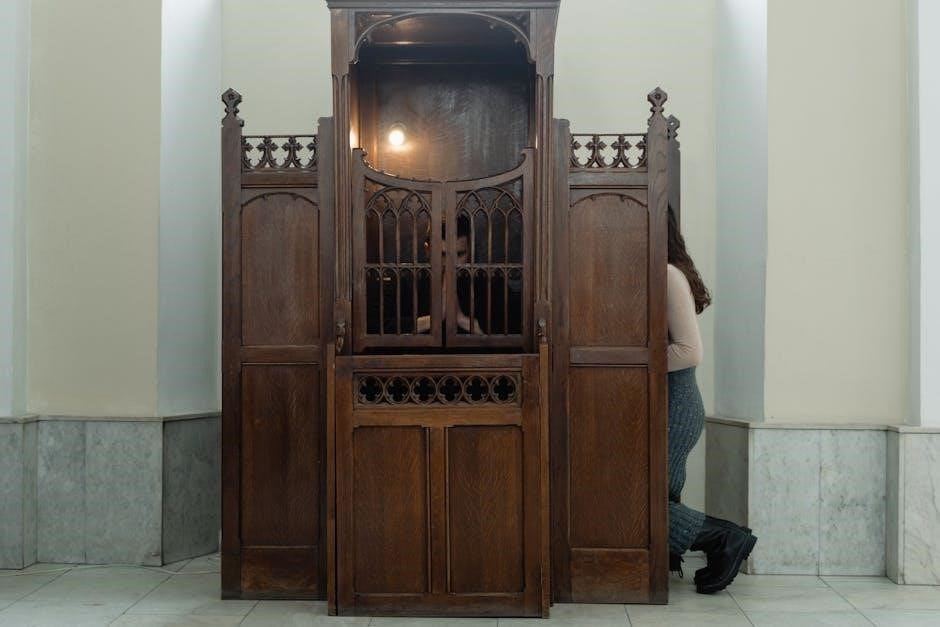
how to go to confession pdf
Confession is a sacred sacrament offering spiritual renewal through sincere acknowledgment of sins. It fosters reconciliation with God and oneself, promoting peace and moral growth. Essential for Catholics, it strengthens faith.

What is Confession?
Confession, also known as the Sacrament of Penance or Reconciliation, is a sacred rite where individuals acknowledge their sins before a priest. It involves a heartfelt admission of wrongdoing, expressing remorse, and seeking forgiveness. This sacrament is rooted in Jesus’ authority to forgive sins, passed on to His Church through the apostles. During confession, the priest acts as a spiritual guide, offering guidance and imposing penance to aid spiritual growth. The process fosters reconciliation with God and the Church, restoring grace and peace to the soul. It is a powerful means of healing and renewal, emphasizing God’s infinite mercy and the importance of moral accountability. By confessing sins, believers take a crucial step toward spiritual cleansing and a deeper connection with their faith.
Importance of Confession in Spiritual Life
Confession holds profound significance in spiritual life, serving as a means to reconcile with God and the Church. It cleanses the soul from sin, restoring grace and fostering a deeper relationship with the Divine. By acknowledging and seeking forgiveness for transgressions, individuals demonstrate humility and commitment to their faith. This sacrament also cultivates self-reflection and moral accountability, guiding believers toward a virtuous life. Through confession, one receives spiritual healing, peace, and the strength to avoid future sins. It is a cornerstone of spiritual growth, enabling Christians to live in accordance with God’s will and attain eternal salvation. Regular confession strengthens the soul, enhancing one’s ability to resist temptation and grow in holiness. Ultimately, it is a testament to God’s boundless mercy and His desire for humanity’s redemption.

Preparation for Confession
Preparing for confession involves prayer, self-reflection, and honest examination of one’s actions. It requires a sincere desire to acknowledge and repent from sins, seeking God’s forgiveness and grace.
Examining Your Conscience
Examining your conscience is a vital step in preparing for confession. It involves reflecting on your actions, thoughts, and intentions since your last confession. Start by praying for guidance from the Holy Spirit to uncover areas where you may have fallen short. Consider the Ten Commandments, the Beatitudes, and other moral teachings as a guide. Be honest with yourself about sins committed, whether through actions, words, or omissions. It’s important to recognize the severity of each sin and take responsibility for them. Making a list can help ensure you don’t forget anything important during confession. This introspection fosters humility and sincerity, essential for a meaningful confession. By carefully examining your conscience, you prepare your heart to receive God’s mercy and forgiveness. This process helps you grow in self-awareness and spiritual maturity.
Prayer Before Confession
Prayer before confession is essential to seek God’s grace and guidance. Begin by asking the Holy Spirit to illuminate your heart, helping you recognize your sins and feel true sorrow. You might pray, “Lord, have mercy on me, a sinner. Give me the strength to confess my sins honestly and seek Your forgiveness.” This prayer prepares your soul for reconciliation and opens you to divine mercy. It also expresses your commitment to change and grow spiritually. By praying before confession, you acknowledge your dependence on God’s grace and demonstrate humility. This step fosters a sincere and meaningful confession, allowing you to approach the sacrament with an open and contrite heart. Prayer sets the tone for spiritual renewal and healing.
Creating a List of Sins
Creating a list of sins is a helpful step in preparing for confession. It ensures that you remember and acknowledge all your sins, fostering honesty and clarity; Begin by reflecting on your actions since your last confession, noting specific instances where you fell short of God’s teachings. Be detailed, including the number of times a sin occurred and its seriousness. This list should be prayerfully considered, asking the Holy Spirit for guidance in identifying your mistakes. Having a written list prevents forgetting important points during confession and demonstrates your commitment to sincerity. During the sacrament, present your sins calmly and clearly, using your list as a guide; This practice helps you take full responsibility for your actions and approach reconciliation with a humble and contrite heart. Remember, honesty is key to receiving God’s mercy and grace.

The Confession Process
The confession process involves entering the confessional, beginning with the Sign of the Cross, and humbly confessing your sins to the priest. This sacred moment fosters reconciliation and peace.

Entering the Confessional
Entering the confessional is the first step in the sacrament of reconciliation. Upon entering, one may choose to sit face-to-face with the priest or kneel behind a screen for anonymity. Regardless of the setup, the atmosphere is one of reverence and confidentiality. It is important to approach the confessional with a humble and open heart, ready to engage in a sincere dialogue with God through the priest. The act of entering signifies a willingness to confront one’s sins and seek forgiveness; Many find comfort in the privacy and sacredness of the confessional space, which is designed to foster contrition and openness. This moment marks the beginning of a journey toward healing and spiritual renewal.
Beginning with the Sign of the Cross

The sacrament of confession traditionally begins with the Sign of the Cross, a gesture that invokes God’s blessings and signifies repentance. Upon entering the confessional, the penitent makes the Sign of the Cross, saying, “In the name of the Father, and of the Son, and of the Holy Spirit. Amen.” This act expresses reverence for God and acknowledges the sacred nature of the sacrament. The priest responds with a warm greeting, welcoming the penitent and inviting them to share their sins. This opening prayer sets a spiritual tone, reminding both the penitent and the priest of the divine presence in the encounter. By starting with the Sign of the Cross, the penitent prepares their heart for honest confession and openness to God’s mercy. This ritual is a powerful reminder of the Trinity’s role in the process of reconciliation.
Confessing Your Sins
When confessing your sins, honesty and humility are essential. Clearly state the sins you’ve committed, avoiding unnecessary details or excuses. Be straightforward and specific, ensuring you cover all serious offenses. For example, instead of saying, “I wasn’t kind,” specify, “I spoke harshly to someone.” This approach fosters accountability and sincerity. After confessing, the priest may offer guidance or ask clarifying questions to deepen your understanding of your actions. Remember, the purpose is not to justify but to seek forgiveness and healing. By humbly acknowledging your sins, you open yourself to God’s mercy and grace. The priest, acting in Christ’s name, will then offer absolution, freeing you from the burden of your sins. This step is a profound moment of reconciliation, restoring your relationship with God and the Church. Approach it with an open heart, trusting in God’s boundless forgiveness.

After Confession
After confession, one feels renewed and at peace; The priest grants absolution, forgiving sins in God’s name. Perform the assigned penance and reflect on spiritual growth. Gratitude and commitment to change follow.
Receiving Penance
Receiving penance is a crucial step after confessing sins. The priest assigns specific prayers or actions to help the penitent grow closer to God. These acts, such as reciting the Our Father or performing a charitable deed, serve as spiritual remedies. The penance reflects the nature of the sins confessed and aims to foster personal conversion. It is essential to complete the assigned penance faithfully, as it expresses genuine contrition and commitment to amendment. By fulfilling the penance, individuals demonstrate their willingness to make amends and strive for holiness. This step strengthens the soul and deepens one’s relationship with God, bringing peace and spiritual renewal. Penance is not a punishment but a means of healing and growth in virtue.

Saying the Act of Contrition
Saying the Act of Contrition is a vital part of the confession process, expressing genuine sorrow for one’s sins. It involves reciting a prayer, such as “Oh my God, I am heartily sorry for having offended Thee,” acknowledging wrongdoing and expressing a firm resolve to avoid sin in the future. The prayer is typically recited after confessing sins and before receiving penance. It is essential to say the Act of Contrition with sincerity, demonstrating true contrition and a willingness to change. The priest may guide the penitent in this prayer, ensuring it is spoken with heartfelt emotion. This act of contrition strengthens the soul and prepares the individual to receive God’s forgiveness and peace. By expressing remorse and commitment to amendment, the penitent deepens their spiritual renewal and reconciliation with God.
Leaving with Peace and Gratitude
After receiving absolution and completing your penance, you leave the confessional with a renewed sense of peace and gratitude. The sacrament brings a deep spiritual cleansing, allowing you to feel reconciled with God and the Church. It’s important to carry this sense of peace into your daily life, reflecting on the mercy and forgiveness you’ve received. Many find it helpful to thank the priest and take a moment to pray, expressing gratitude for the grace of reconciliation. This moment is a beautiful opportunity to reconnect with God and commit to living a virtuous life. Leaving confession with peace and gratitude strengthens your faith and inspires you to grow closer to God. It’s a powerful reminder of His infinite love and mercy.